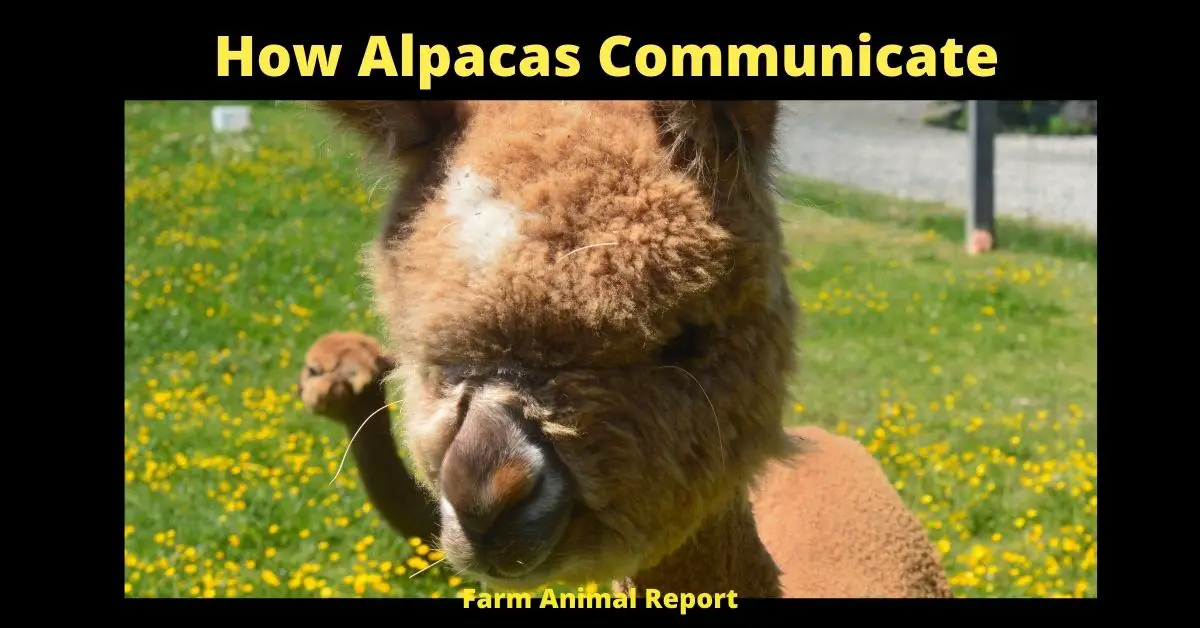Alpaca Noises – As a general rule alpaca sounds mean different things, the sounds they make include Humming, purring, clucking, snorting, screaming, and ogling. Alpacas communicate with each other through the use of sounds, body language, and physical contact. They are very social animals that live in herds or groups that may consist of 20 individuals or more!
Alpaca Noises – What Sound do Alpaca Make?- How Alpacas Communicate
Alpaca is not just to be admired from afar. Alpacas can be great companions, but before you adopt one as a pet, it is important that you know Alpaca sounds and behaviors. Here are some of the llama sounds that Alpacas make: Alpaca Sound What Sound do Alpaca Make?
- Humming
- Purring
- Grunting
- Clucking
- Snorting
- Grumbling
- Alarm
- Screaming
- Orgling
Alpaca Language – Noises – Sounds
Alpaca Sounds – Alpacas communicate with each other through the use of sounds, body language, and physical contact. They are very social animals that live in herds or groups that may consist of 20 individuals or more! From this fact alone, it should be no surprise that Alpaca noises can get quite loud at times. Alpaca Noises
Check Out Amazon’s Educational Resources for Raising Alpacas
The herd is led by a dominant male and female who are constantly communicating with each other and the rest of the herd. Alpacas have one main type of sound that they use to communicate, which is known as low-frequency humming. This sound has a soft tone to it that can only be heard by other alpacas within their herds or groups
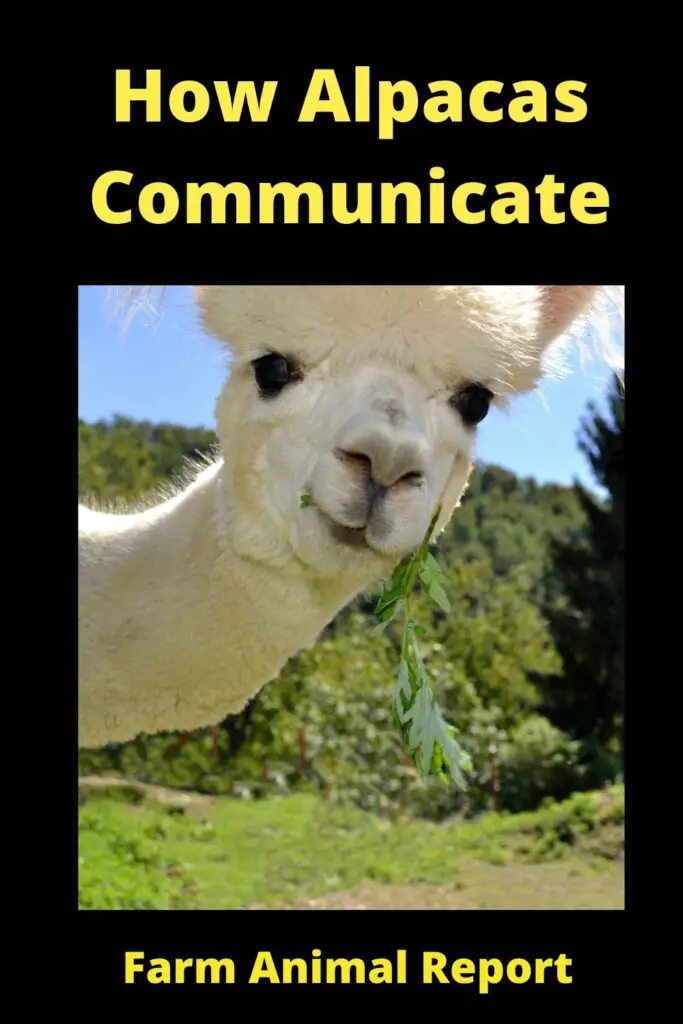
Alpaca Humming – Male Alpacas Make
When an Alpaca is humming, they are sending a message to its herd that something is wrong or that there are predators nearby. They are trying to warn the rest of the herd that danger may be lurking about.
Humming serves another purpose as well, which can also relate back to why Alpacas make this sound when they see predators. When alpacas feel threatened or anxious, they will also produce a low-frequency humming noise. This sound is meant to “comfort” the other members of their herd and let them know that there is nothing to be afraid of as well as make them feel safe and secure.
18 ways Alpaca Farmers make Money
Humming can also occur if an alpaca senses that another animal or human may be feeling anxious or on edge. In this case, the alpaca will produce a low-frequency humming sound to try and calm down whomever they sense may be frightened.
Alpaca Grunting – Sound
An adult male Alpaca is bound to have an opinion or two about something! While some males will argue or fight with other male alpacas, others are more likely to let their feelings be known by grunting.
Alpacas will grunt if they get into an argument over food or another resource with another male that is of the same social status. A grunt may also be sounded when one Alpaca challenges another in order to try and establish dominance within the herd. Male Alpacas Make – Sounds Alpacas Make
The grunting sounds that alpacas make can also be heard when they are aggressive or dominant with another animal or human, especially if they feel threatened by them.
So why exactly does an Alpaca grunt? It is possible that this sound could indicate whether an alpaca feels dominant, submissive, or neutral in a situation with another animal or human.
Alpaca Clucking
While it may sound like the clucking noises that an alpaca makes are being made by a hen, rest assured… they are not! These are used to communicate with other members of their herd, not another type of bird.
An alpaca will produce a clucking sound when they are nervous or afraid of something. They will also occasionally use this sound if they do not want to be touched by another human or animal, but let the other party know that it is nothing personal and simply wants to be left alone at the moment.
The clucking sound can also show dominance towards another alpaca and signal that the dominant alpaca does not want the other one to come closer.
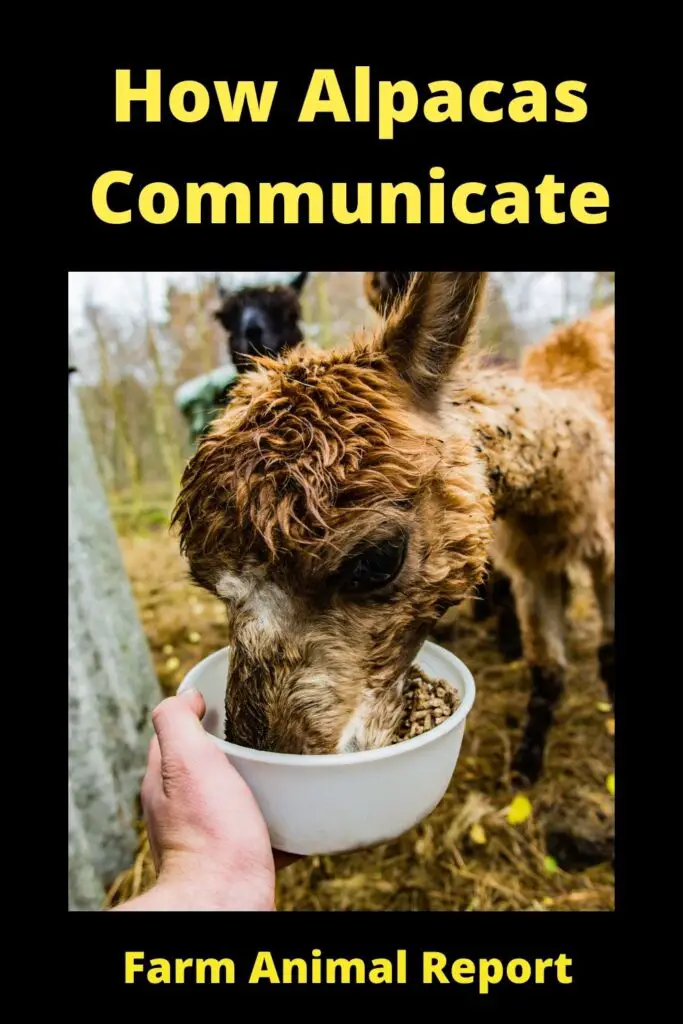
Alpaca Snorting
Snorting is a sound that your alpacas will produce when they sense danger and it is time for them to run away! While most Alpacas do not like fighting or getting into confrontations, this is Alpaca’s way of letting the rest of the herd know that they need to flee before getting hurt.
Snorting can also be heard if an Alpaca senses that another animal or human is trying to threaten them in some way, as a warning noise. In this case, it will sound as though your alpacas are snarling at the other animal or human, letting them know that they are not welcome to come any closer.
Alpaca Spitting
Spitting is an Alpaca’s way of telling another herd member that they do not want them anywhere near them or what they are currently doing. This sound will be used when an alpaca feels threatened by another animal or human, but also if another Alpaca tries to coerce them into giving up access to a food source by trying to charge in and steal the food.
Spitting can also be heard when an alpaca senses that another herd member may be ill or injured in some way. In this case, they will use this sound as a warning as to not get closer, in order to avoid being sick or injured themselves.
Alpaca Grumbling
Adult males will produce a noise that sounds similar to grumbling when they are angry at something another animal or human has done. This can include if one alpaca steals another Alpacas’ food source and the dominant male has not been able to stop it, as he would usually do.
Grumbling can also be heard if a male wants his family unit to move closer or further away from another herd member or human. This sound may mean “get out of here” and is likely to only be used on animals and humans that they feel threatened by.
Alpaca Barking
While barking may sound like a dog noise to human ears, it is actually quite different. Alpacas will produce this sound when they sense danger and want everyone else in their herd to know about it too!
Barking can be heard if another animal or human makes them feel threatened or scared for their safety. It may also be used as a warning to other herd members of possible danger that may or may not be present at the moment, depending on the situation.
Alpaca Screaming
Screaming is not an Alpaca noise that you will want to become familiar with! This sound indicates that something very bad is going on, and is a call for help from your alpacas. This sound will be made if another animal or human has managed to seriously injure or kill an Alpaca in the herd.
Screaming can also be heard when a male alpaca senses that a female alpaca could become pregnant, usually from being mounted by a male alpaca from another herd. In this case, the male will usually scream to let all of the female alpacas in the same area know that he is looking for a partner to breed with and they need to leave.
Alpaca Purring
The purring sound is an interesting noise that your alpacas will make when they are happy about something. This includes if you are giving them treats, feeding them, or petting them! They may also make this noise with other herd members as a way to ask for attention from the other animals. In addition, your alpacas may purr when they are in serious pain and need medical attention! This is a sign that you should call your veterinarian.
Alpaca Alarm Call
Alarm calls are sounds that alpacas make when they hear or see something that they deem to be potentially dangerous. This may include an animal passing too close to the herd, another person approaching, or even a nearby dog. If your herd hears this sound, it is important for you to find out what caused them to be alarmed and take appropriate action to ensure their safety. Alarm calls tend to be more frequent in situations where they cannot see or hear the danger directly, such as if another human is walking up behind them and the herd member making the alarm call can only hear them closing in on them.
Some alpacas will also emit high-pitched squeaking sounds, known as “pip squeaks” or “alarm barks.” These are not to be confused with the barking sound that adult males will make when they feel threatened by something! While these sounds may sound like an alarm call (and sometimes come in threes), they are different. This is because this particular noise tends to be made when an alpaca is startled or surprised by something unexpected, such as a stranger entering their area.
For instance, your alpacas may make this noise if they are outside in their pasture and another animal stumbles into the field where they are grazing. It could also be heard when you approach them with food treats for them to eat, or when they are playing with you and something unexpected, like another person entering the area (or even another animal), interrupts their fun.
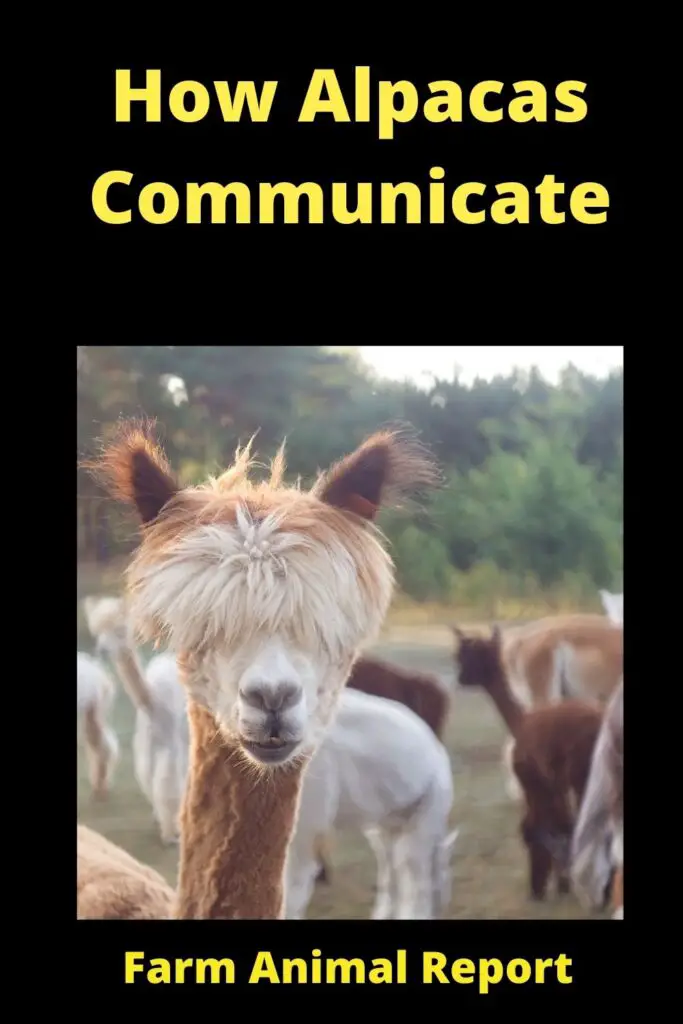
Alpaca Mating Trill
This noise is the sound that an alpaca (of either gender) will make during mating. This can be heard when a male alpaca mounts a female in an attempt to breed with her. If successful, this mating call may also end with the female pregnant and giving birth eight months later!
If you do not want this to be the case, it is important to separate males and females in your herd so they do not breed. However, you must keep in mind that half-bred female alpacas produce only 50% of the fleece as those born from two un-mated parents!
The trill can also serve as a warning to other herd members that there is a potential danger nearby. When heard, the other alpacas in the herd will join in with their own calls to warn each other of whatever might be going on. The trill may also indicate frustration over not being included in something, such as when you are feeding treats to another alpaca and they get jealous! In some cases, the trill may also indicate that an alpaca is in some type of distress or pain. If you hear this call, it’s important for you to check on your alpacas and ensure that there isn’t anything going on with them that requires medical attention!
Alpaca Squeaking
The squeaking sound that is made by alpacas is very similar to the noise that humans make when we are in a state of surprise. It’s used as a way for your herd members to express their fear or anxiety over something going on around them, such as a storm passing through the area. If you hear this sound from an alpaca, it’s important for you to check and make sure that they aren’t scared of anything!
Alpaca Sparring Call
This sound is made by an alpaca (of either sex) when it steps up to battle with another individual in the herd. It may be used as a way to establish dominance or warn other members of the herd that there is a potential conflict.
If you notice your alpacas making this sound at each other, it’s important for you to separate them as soon as possible and figure out what caused the conflict in the first place! We recommend using a pig panel or large wooden stake to create a barrier between them so they can’t see each other.
Alpaca Whining
This noise is made by an alpaca (of either sex) when they are in pain or distress. For example, if your alpacas ate something toxic and start exhibiting symptoms of food poisoning, you will notice them emitting this sound because it hurts for them to stand up straight! If you hear this sound from an alpaca, it’s important for you to get them some veterinary assistance immediately.
Keep in mind that it is very unlikely (and even dangerous) for your alpacas to make this noise when they are using some type of tool or staking device to climb a fence! This is actually quite common for them to do, especially when there is something that they are trying to climb over or crawl under. As long as your alpacas are not attempting to jump up onto something by leaning against the fencing material, this should be safe for them to do!
Alpaca Sneezing
When an alpaca sneezes, it is expressing its discomfort with something in the surrounding area. For example, your alpacas may be feeling a bit dusty or might have some type of irritant in their nose that they are trying to get rid of! As long as you do not notice any symptoms of illness in your herd, this should be perfectly normal for them to do.
Alpaca Coughing
Alpacas can also emit a coughing sound when they are sick and trying to expel some type of irritant from their windpipe. This may be due to dust, but it can also be because of foreign objects such as small pieces of hay or alfalfa that were accidentally inhaled by your herd members.
If you notice this sound coming from an alpaca, it’s important for you to give them some space and remove anything that might be causing this discomfort.
Alpaca Bleating
The bleating sound is emitted by both sexes of alpacas when they are in pain or distress. For example, if one of your alpacas has arthritis and it becomes difficult for them to stand up properly, you will notice this sound come from them. Alpacas do not use this noise when they are in a playful or excited state; rather, they make this loud noise when something is hurting them and they want you to fix the problem!
If your alpacas start emitting a bleating noise, it’s important for you to provide them with some veterinary assistance. They are not bleating because they are hungry or want their food; rather, your alpacas are trying to communicate that something is wrong!
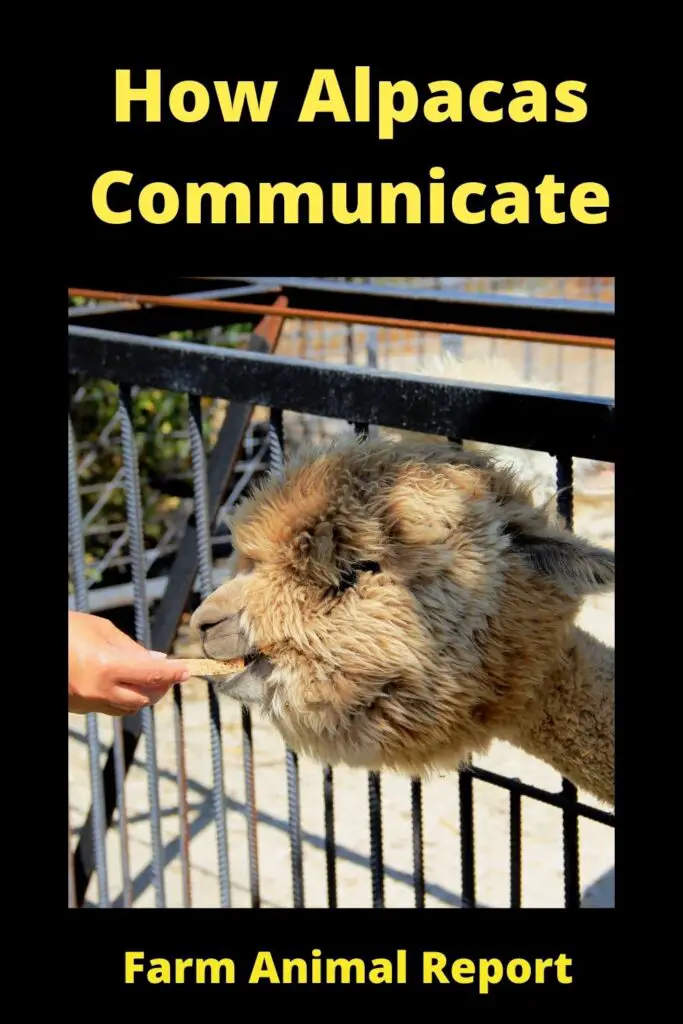
Alpaca Clicking
This sound is often used as a way for alpacas to express happiness and contentment. For example, if your herd members are excited about feeding time and you hear them clicking at one another as they anticipate the upcoming mealtime, this is completely normal.
Alpacas also use this noise as a way to express that they like something (for example you, their food, or even their new sleeping arrangement).
Final Thoughts – Alpaca Sound
Alpacas communicate with each other and their owners in these various methods and sounds.


